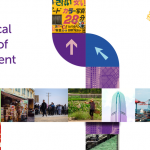Political Economy of Development | SOAS
The SOAS MSc Political Economy of Development provides unique training in pluralist theories, covering both conventional as well critical economics paradigms. Students will benefit from quantitative and qualitative training and critically use these to analyse and address economic challenges, such as corruption, inequalities, and climate change.
How does the programme provide content to ensure students achieve an understanding of a reasonably diverse set of perspectives on understanding economies?
In the Political Economy of Institutions module, students will learn about the economics of institutions and the role of political economy in understanding institutional performance in Global South countries. The Growth and Development module applies theory to real economic problems, such as intersecting inequalities and climate change in regions and countries in the Global South. The Statistical Research Methods course covers not only standard topics in econometrics and quantitative research skills, but also gives practical training in using survey data, understanding sampling techniques and qualitative statistical methods. The Research Methods module equips students with the basic tools to undertake independent research and to evaluate the methods through which the results of development research are generated.
How does the programme ensure students understand the interaction between economic and ecological systems?
Students are introduced to the tradition of ecological economics which views the economy as being embedded into the ecosystem. In the core module ‘Growth and Development’, mainstream and heterodox theoretical approaches to the economics of climate change are discussed. Students also engage with the recent debates about the role of policies for achieving the transition to a low-carbon economy. Optional modules, like the ‘Economics of Environment and Development’ and ‘Green Finance’ give students the opportunity to obtain a deeper understanding of the interactions between economic, financial and ecological systems. Students can also participate in the SOAS Economics Sustainability Working Group which organises reading sessions on the links between economics and ecological sustainability.Students are introduced to the tradition of ecological economics which views the economy as being embedded into the ecosystem. In the core module ‘Growth and Development’, mainstream and heterodox theoretical approaches to the economics of climate change are discussed. Students also engage with the recent debates about the role of policies for achieving the transition to a low-carbon economy. Optional modules, like the ‘Economics of Environment and Development’ and ‘Green Finance’ give students the opportunity to obtain a deeper understanding of the interactions between economic, financial and ecological systems. Students can also participate in the SOAS Economics Sustainability Working Group which organises reading sessions on the links between economics and ecological sustainability.
How does the programme ensure students understand how to critically explore real-world evidence, both qualitative and quantitative?
Statistical Research Techniques is a module designed specifically to address the distinctive needs of political economy of development. The course Research Methods aims to acquaint students with various issues bearing on research in the social sciences in general, and political economy of development, in particular. It introduces a range of approaches to research and seeks to help students understand the strengths and weaknesses of different methods for various research objectives.
What pedagogical approaches does the programme use to ensure that students examine the historical context, assumptions and values in all economic thinking?
The two core theoretical modules provide political economy training in historically evolved power balances affecting institutions, growth and development. Most of the modules do not rely on a textbook approach. Instead, a variety of sources (including academic papers, newspaper articles and videos) are used to introduce students to different perspectives to economic issues and equip them with the capacity to examine the links between different economic theories and the real world. Students are explicitly asked in their assessments to compare and contrast different theoretical perspectives and use theories to evaluate contemporary economic phenomena and policies, like the COVID-19 crisis.
How does the department ensure that the teaching culture and capacity to deliver economic pluralism are continually improving?
The SOAS Department of Economics has a deep commitment to economic pluralism. The Department remains strongly committed to decolonising its curriculum and to the explicit incorporation of ecological sustainability issues into core and optional modules. It propels forward the Decolonising SOAS agenda and its Sustainability Working Group makes suggestions regarding readings to be included in SOAS modules in order to make them more aligned with the climate emergency. The Department also works closely with the Open Economics Forum, which is the SOAS student-led chapter of Rethinking Economics. Multiple feedback loops ensure that students’ suggestions regarding economic pluralism are incorporated into the modules and programmes.
Other information:
The SOAS MSc in Political Economy of Development and the pluralist approach to real world economic and development issues will prepare students to work in international organisations, government, business and finance, and NGOs. The research training in political economy and economics also serves as an excellent foundation for PhD studies.
Country:
United Kingdom
University:
SOAS
Course name:
Political Economy of Development
Department/school:
Department of Economics
Course level:
Taught Masters
Course language:
English

 all programmes
all programmes